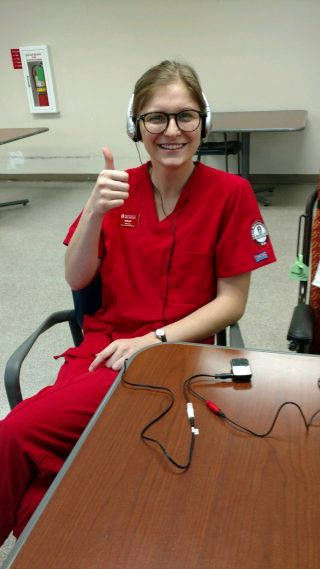Hailey Parker is a senior in nursing school at the University of Arkansas. She took Dr. Weymiller’s service learning course in spring 2018. Please read her reflection below. The music […]
Hailey Parker is a senior in nursing school at the University of Arkansas. She took Dr. Weymiller’s service learning course in spring 2018. Please read her reflection below.
The music and memory program will forever be one of the most impactful programs that I will ever be a part of during my 4 semesters in the nursing program at EMSON. I can confidently say that knowing how many moving experiences I was able to witness during the semester. Whether it was with one of my music and memory residents, or a fellow student’s resident, the lights in some of their eyes when we sat down with them and listened to their favorite songs, just put the biggest smile on your face and the best feeling in your heart!. First of all, getting to know the residents on a personal level, and not just for their diagnoses, made helping these veterans so much more worth it. Getting to know them on the level that allowed us to create a personal music playlist that was designed strictly for them. If you got really lucky they would tell you their favorite songs and you would get to listen to it with them!
A resident that I was originally assigned with, who had a mild form of dementia, had told me his favorite song was “Paradise by the Dashboard Light” by Meatloaf and when I played it for him through the headphones, he turned to me with the biggest smile on his face and asked me to dance with him! He then began to tell me about his wife who he is still so madly in love with, and many other experiences with his family members in the past. Another experience I had was with a fellow student who was assigned to a resident who had a stroke on the left side of his brain and was paralyzed on the right side. He was also nonverbal. She ended up finding some songs that he enjoyed from the social worker and the resident’s family members. When I watched her play one of his favorite songs for him he actually sang out loud some of the words from the song! Most of the CNAs and LPNs had never heard him make out any understandable words while caring for him after his stroke. It was amazing!
The last truly remarkable experience I observed was with a very agitated patient who had been wheeling into people in his wheelchair and just seemed very distressed. We decided that this would be a good time for an emergency music intervention. Once we started playing the music for him, it took about 15 minutes for him to become less angry and fall asleep. Once he woke up he was like a new person. But what is really interesting to me is that the music worked in the same way an antipsychotic medication would have. It would have taken the medication about 30 minutes to induce a therapeutic effect on the patient, but the music did the same thing and ultimately saved the patient from a harmful medication. All the patient needed was a little music therapy and a nurse’s therapeutic touch. The music and memory program was and will be one of the most unforgettable programs that I will ever get to experience and I can’t wait to tell my future clinical instructors and fellow students about it!
